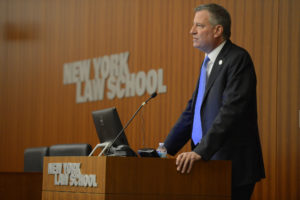The proposed reformations increase transparency and community involvement, and impose new safeguards to protect against systemic abuse. On July 8, 2016, Mayor Bill de Blasio proposed a series of reformations to the procedures used in removing limitations on potential uses, or deed restrictions, from formerly City-owned property. The proposed reformations would require parcels to meet stricter criteria to be deemed eligible for their deeds to be modified, and they would increase the levels of transparency and community engagement in the deed-modification process.
The existing deed-modification policies and procedures, which have been in effect since 1991, regulate the release of deed restrictions from formerly City-owned property. In 2010, the Department of Citywide Administrative Services (DCAS) formalized the procedures, under which a property owner need only pay DCAS 25 percent of the parcel’s appraised fair market value (FMV) in order to have a deed restriction lifted off the property. The current procedure fails to consider whether lifting a specific deed restriction would go against a broader City policy or impede the City’s ability to achieve its program-related goals, and it does not provide for substantial public participation.
The issues within the existing deed-modification policies and procedures were brought to light in February 2016, when the Rivington House, a former nursing home located in the Lower East Side of Manhattan, was sold to private condominium developers immediately after the use-restrictions were lifted from the property. The Allure Group, a nursing-home operator, had purchased the former nursing home from VillageCare in February 2015 for $28 million with the intent of using the building to run a for-profit nursing home. The parcel was encumbered by a two-part deed restriction requiring the property be used by a non-profit organization and that the building be used as a medical residential care facility. In November 2015, the City lifted the two-part restriction from the deed in exchange for approximately $16 million. Three months later, the Allure Group sold the unrestricted property to private condominium developers for $116 million.
Mayor Bill de Blasio’s proposed reformations to the existing deed-modification procedure would make clear that the removal of any deed restriction must advance the City’s policy-goals. In fact, the proposed reformations would mandate DCAS to consult with other City agencies in deciding whether modifying a deed will advance the goals of the City’s policies and programs. As such, the removal of a deed restriction in its entirety would be a rare occasion. The profit which the City stands to gain in modifying the deed would be a secondary consideration. In lieu of the flat-rate fee of 25 percent of FMV, DCAS would instruct appraisers to value each unique proposal on a case-by-case basis.
The proposed reformations would also add new safeguards and impose a new layer of oversight over the deed-modification procedures. DCAS would include legally binding language with its deed modifications to ensure the property is restricted from being transferred or used for a different purpose than intended at the time the modification is made. The Mayor’s Office of Contract Services, which is currently authorized to grant mayoral approvals relating to real estate, would assume an administrative role, whereby it would make policy recommendations to the Mayor, who would then be in charge of reviewing such recommendations ad taking the final action. Finally, the Mayoral Administration and the City Council would work together to substantially enhance the notifications that would be provided to communities that would be affected by a deed-modification.
Additionally, Mayor de Blasio’s proposed reformations would re-invest into the Lower East Side the $16 million collected by the City for modifying the Rivington House deed.
“These revised rules ensure that public good comes first, while also increasing transparency and the participation of the community in future deed modifications,” said Mayor Bill de Blasio. “The proposed changes will also address issues raised by the Rivington House transaction so that we can prevent similar outcomes in the future.”
Immediately following Mayor de Blasio’s announcement on July 8th, Public Advocate Letitia James issued a press release addressing the need for heightened accountability and transparency within the deed-modification process. “The City Council should have oversight on the lifting of deed restrictions,” said Public Advocate James. “This will ensure accountability and transparency in an otherwise opaque process with real implications for our communities.”
Mayor de Blasio anticipates publicly promulgating an administrative rule on the proposed reformations in the upcoming months.
Mayoral Announcement: Proposed Revisions to Deed-Restriction Removal Process (July 8, 2016).
By: Jessica Soultanian-Braunstein (Jessica is the CityLaw Fellow and a New York Law School Graduate, Class of 2015)


